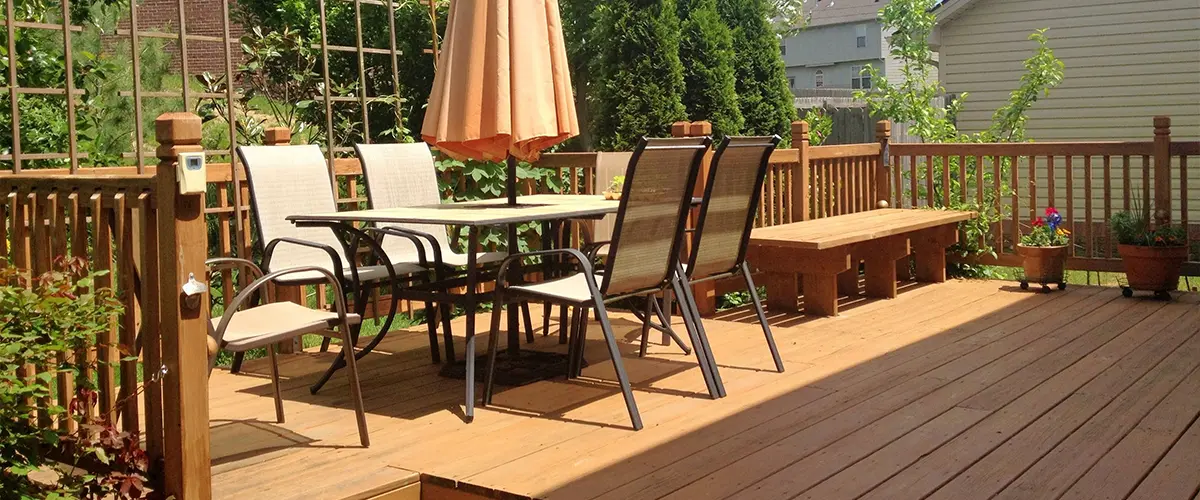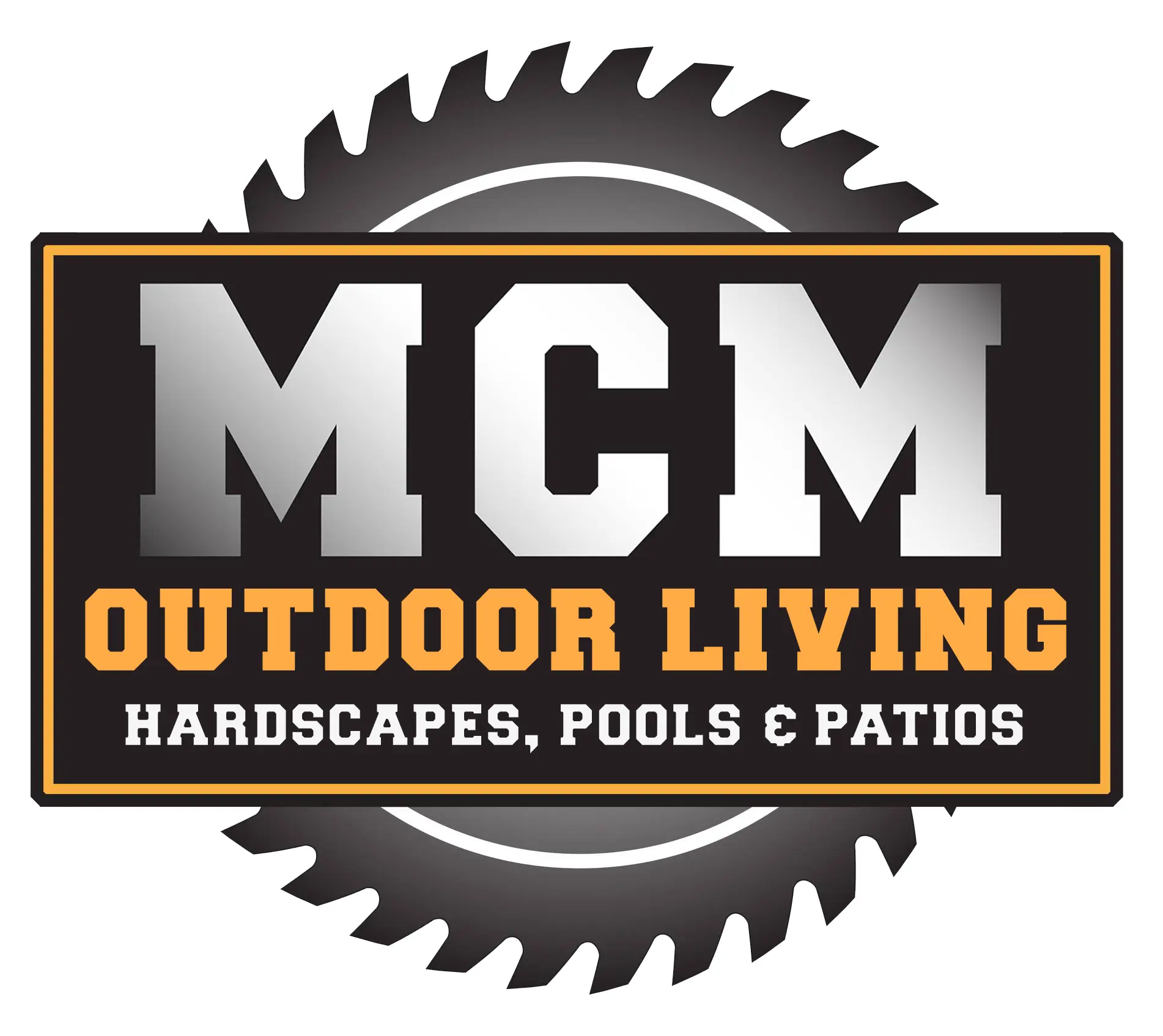Wood Vs Composite Deck: Which One Makes A Better Investment?
Choosing the right decking material can be a daunting task, with many factors to consider. But if you’re looking for a cost-effective, beautiful, durable, low-maintenance material, there is one decking material that beats all the others!
Let’s dive into the wood decks vs composite decks debate and figure out if composite decking is a better investment for your property, or you’d rather enjoy the beauty and affordability of a pressure-treated wood deck.
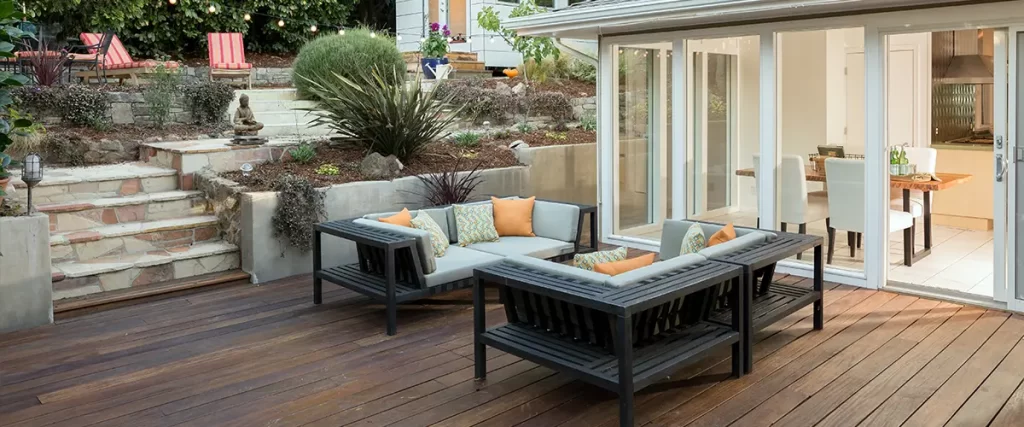
Wood Decks
Wood Decks Pros
- Authentic Appearance: Wood decks give off a natural and rustic look that other materials cannot match.
- Economical Choice: Generally, wood decks cost less to install initially compared to composite decks.
- Easy Installation: The process of installing wood decks is straightforward, making it a faster choice.
- Variety: Wood decking comes in various types such as cedar, pine and redwood, providing plenty of options to suit your taste.
- Warm Feel: The texture and warm tone of natural wood enhance outdoor living spaces.
- Customizable: You can stain or paint wooden decks any color you want, offering more customizability than composite decking materials.
- Repairable: Damaged planks on a wooden deck can be replaced individually without the need to overhaul the entire deck system.
- Heat Resistance: Unlike synthetic decking materials, wood does not absorb as much heat, making it more comfortable underfoot in hot weather conditions.
Cons of Wood Decks
- Natural wood requires frequent maintenance: Regular cleaning, sealing, and staining are crucial to keep it looking fresh and prolong its life.
- They are more susceptible to damage: Wood is prone to warping, cracking, and splintering over time due to weather conditions.
- Wood decking materials can become slippery when wet: This poses a risk of accidents especially during rainy or snowy seasons.
- More prone to insect damage: Termites and other insects can seriously harm the integrity of your deck.
- The color may dull over time: Despite its initially warm tones, wood begins losing its vibrant color as years pass.
- Higher long-term costs: While the initial purchase may be economical, the cost of regular upkeep might turn out higher in the end.
- Pressure - treated wood decks pose potential health hazards as they contain harmful chemicals which could leak into your home environment.
- If not sourced responsibly, natural wood decking can lead to deforestation impacting our environment negatively.
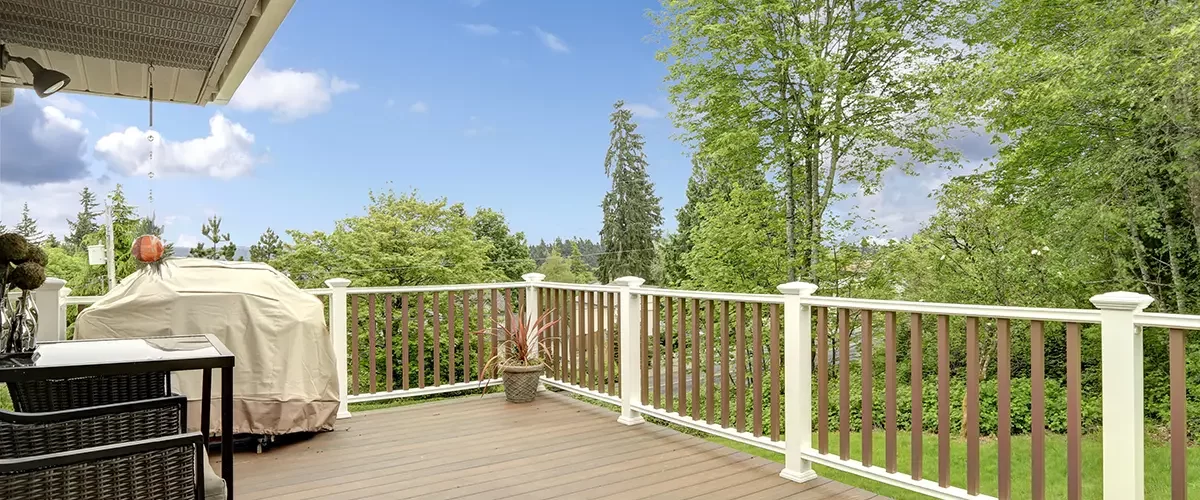
Composite Decks
Pros of Composite Decks
- Durability: Composite decks can outlast wood, resisting damage from weather, insects, and daily use.
- Low Maintenance: Say goodbye to regular staining or sealing - composite decks only require occasional cleaning.
- Variety in Design: Ready for a unique deck? From various colors to textures that mimic real wood, composite offers limitless design options.
- Resistant to Elements: These decks show impressive resilience against sun fade, warping from heat, or cracking in cold weather.
- Eco-Friendly choice: Made of recycled materials, this decking option promotes sustainability.
- Safety First: Without the risk of splinters or sharp edges like its wooden counterpart, composite is a safer option for households with kids or pets.
- Value Addition: Composite decks can boost your home resale value due to their longevity and minimal upkeep needs.
- Consistency in Appearance: Composite decks remain visually appealing over time as they don't suffer from natural wear and tear like peeling paint or staining.
Cons of Composite Decks
- Prone to fading: Over time, the color of composite decking can fade due to exposure to sunlight and harsh weather conditions.
- Susceptible to scratches: While composite decks are generally durable, they can still get scratched, especially if you drag heavy objects across them.
- Higher upfront cost: Compared to wood decks, composite decks tend to have a higher initial purchase price. However, they may balance out in the long run due to lower maintenance costs.
- Limited design options: While there are various colors and styles available for composite decking, the choices might be more limited compared to natural wood options.
- Potential heat retention: Composite decks can become hot under direct sunlight, making it uncomfortable for bare feet on a scorching summer day.
- Can be slippery when wet: Composite decking can become slippery when wet, increasing the risk of accidents, especially by pools or in areas prone to rain.
- Less environmentally friendly: Although composite decks are made partly from recycled materials, the manufacturing process still requires energy and resources.
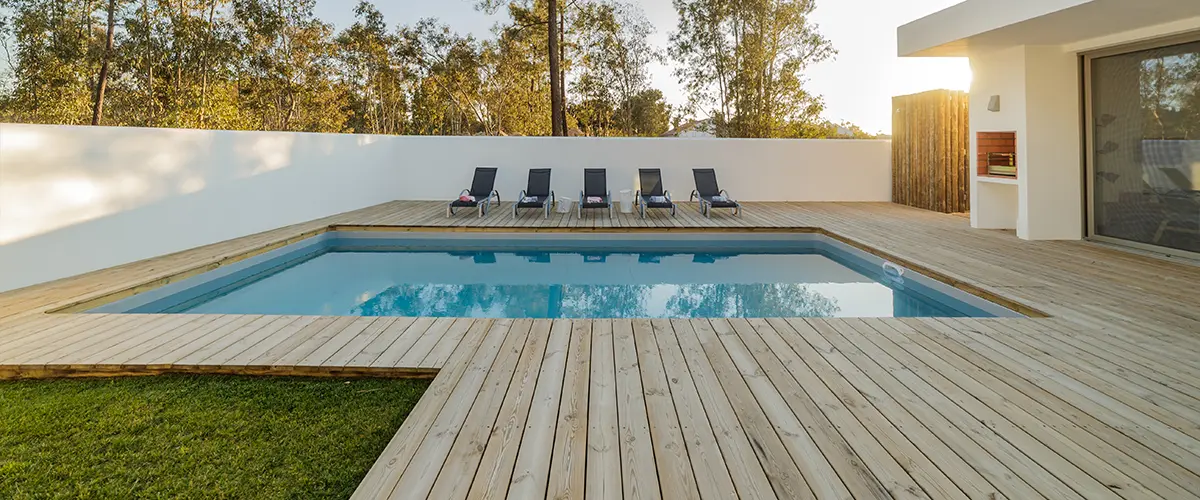
Wood Vs Composite Decks Comparison
When comparing wood decks and composite decks, factors such as cost, maintenance, durability, and aesthetics should be taken into consideration.
Cost
Wood decks are generally more affordable than composite decks. This is because wood is a natural material and its initial purchase cost is lower compared to the manmade materials used in composite decking. Additionally, if you're on a tight budget, choosing wood over composite can help you save money on your initial project budget. However, keep in mind that while wood may be more economical upfront, it may require more maintenance and repairs in the long run, which could add to your overall costs.
Maintenance
Maintaining a deck is an important aspect to consider when choosing between wood and composite materials. Wood decks require regular maintenance, such as staining or sealing, to prevent rotting, warping, and decay. This maintenance can be time-consuming and may need to be done annually or biannually. On the other hand, composite decks are low-maintenance and only require occasional cleaning with soap and water. They do not need to be stained or sealed like wood decks. This makes them a convenient option for homeowners who prefer minimal upkeep.
Durability
Composite decks are known for their exceptional durability. Unlike wood decks, composite decks are made from a combination of wood fibers and plastic, which makes them resistant to rot, warping, and insect damage. These decks have high tensile strength and can withstand heavy foot traffic without showing signs of wear and tear. They are also more resistant to fading and staining compared to wood. With minimal maintenance, composite decks can retain their structural integrity and beautiful appearance for many years, making them an excellent long-term investment for homeowners looking for a durable outdoor decking solution.
Aesthetics
Wood decks and composite decks differ in their aesthetics, offering homeowners different options to suit their preferences. Wood decks have a natural and authentic appearance, providing a warm tone that adds charm to outdoor living spaces. The grains and textures of natural wood give it a unique character that cannot be replicated by synthetic materials. On the other hand, composite decks come in various colors and styles, allowing for more customization. While they may not possess the same authenticity as wood, they offer a sleek and modern look that can complement contemporary homes. Whether you prefer the traditional warmth of natural wood or the versatile options of composite decking, both choices provide aesthetic appeal to enhance your outdoor space.
Conclusion
All in all, composite decks are the best choice for all homeowners, regardless of their preference, budget, or time for maintenance.
Composite can mimic the natural look of wood very well, they’re a great long-term investment with very low on-going maintenance costs, and they’re overall much more durable, lasting, and efficient than lumber.
Here at MCM, we take pride in installing some of the best composite decks in Northern Texas. We offer a complete deck building service, from getting the permits for you to building you an outdoor space that matches your style and fullfils your needs.
Contact us for a free quote or talk to us directly at (469) 583-6213.
